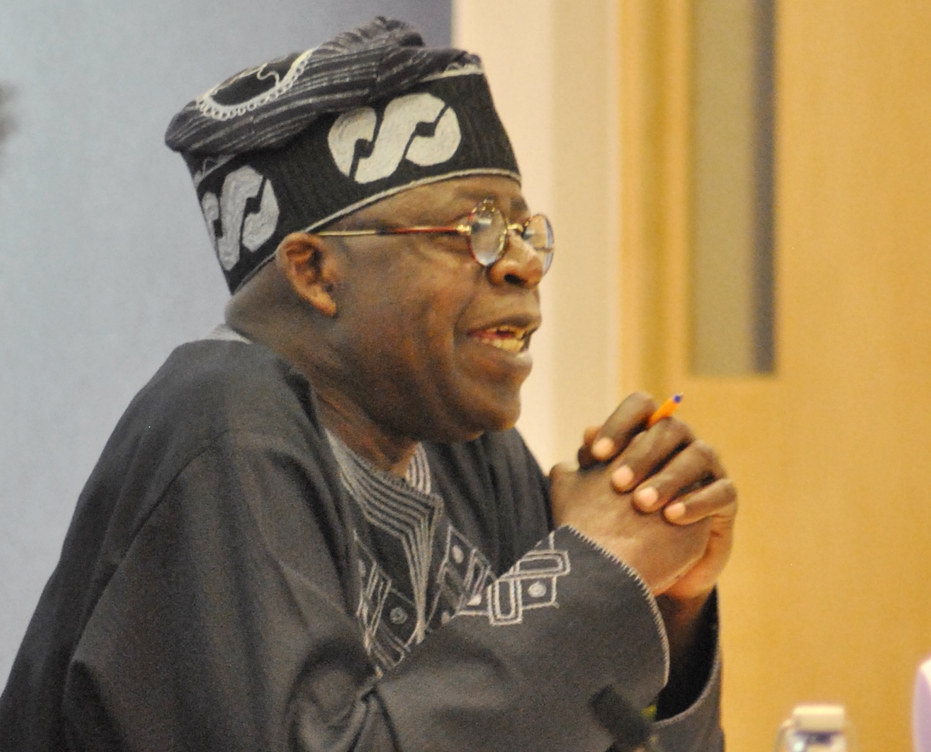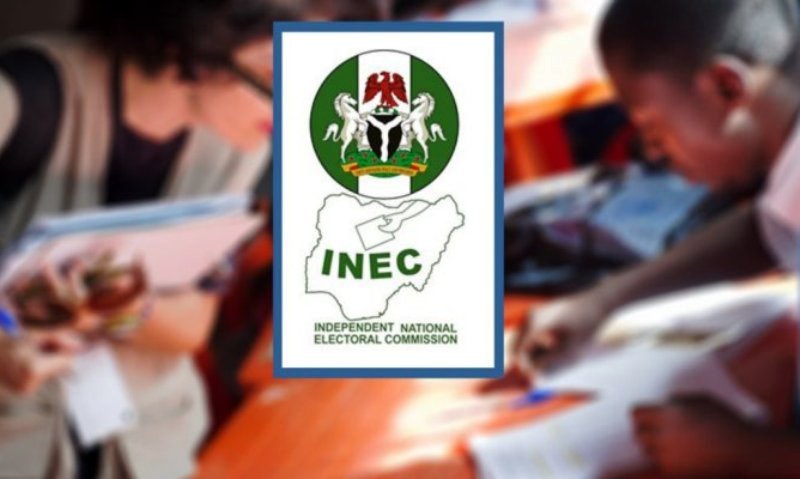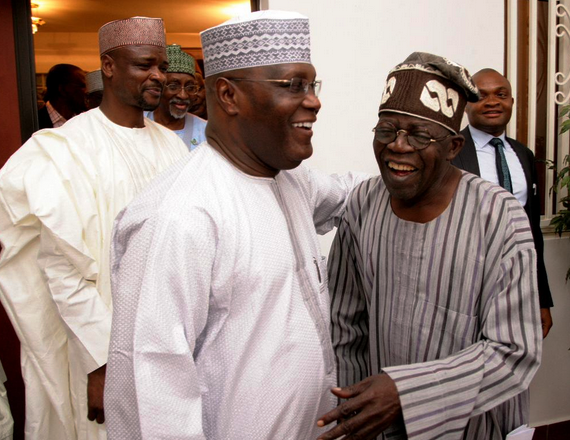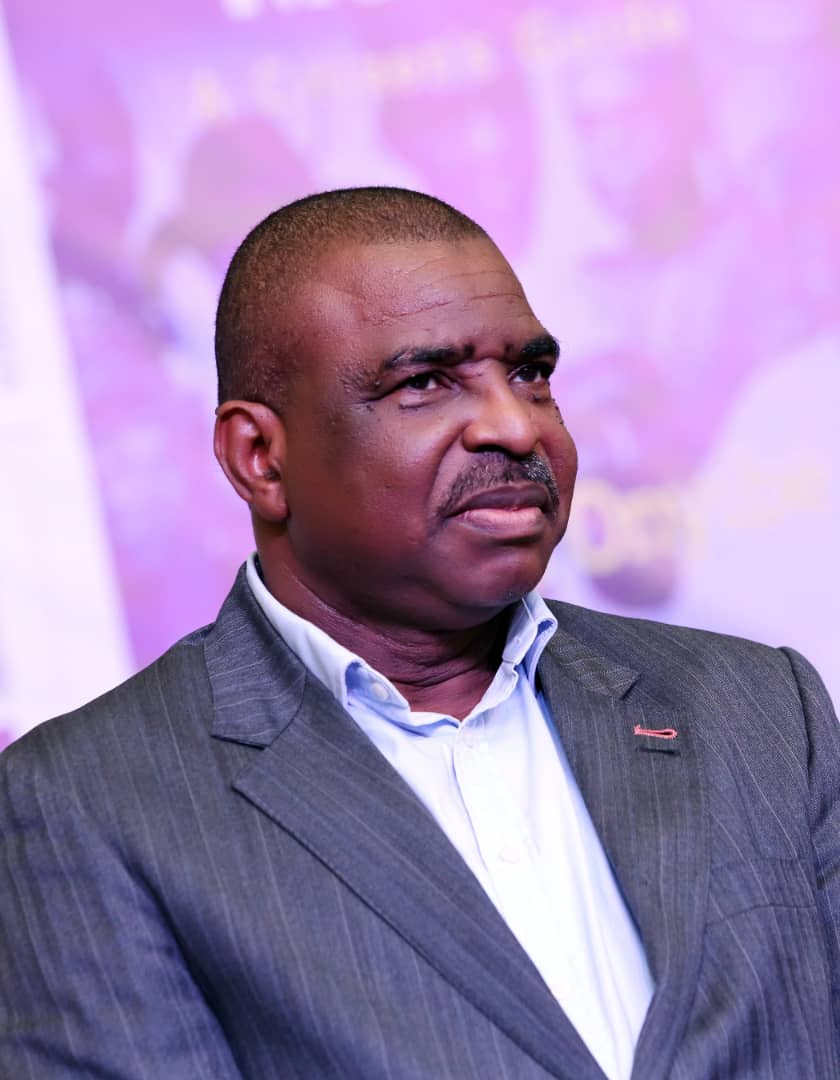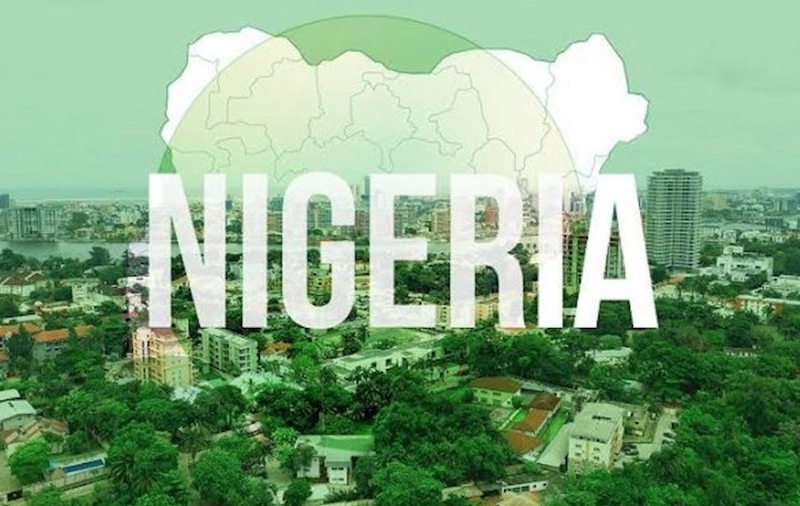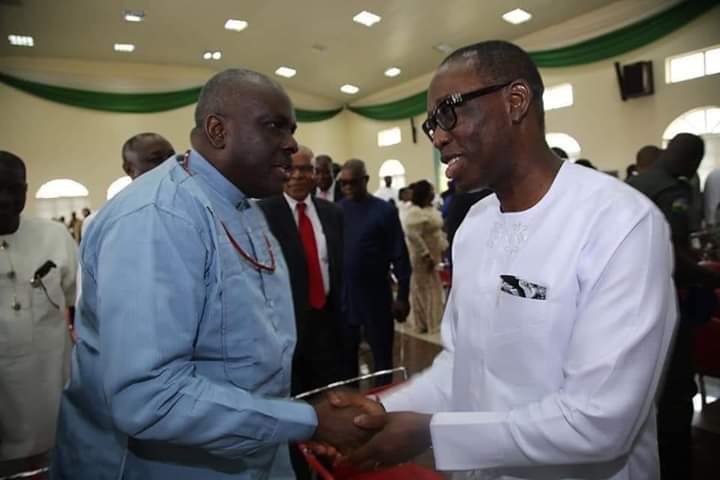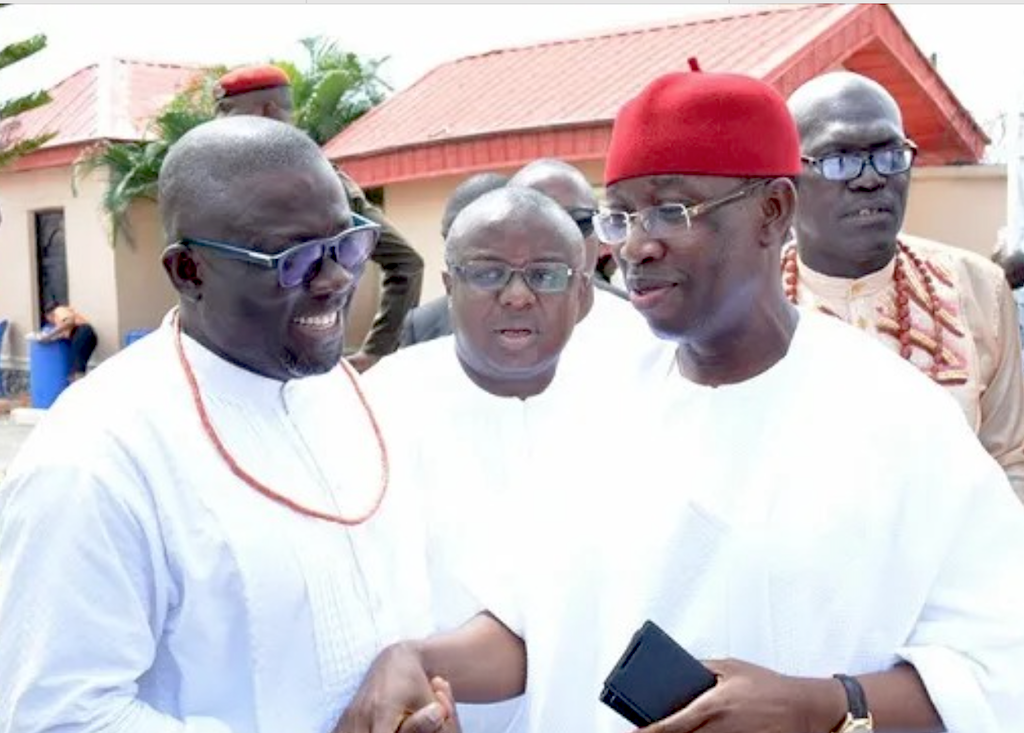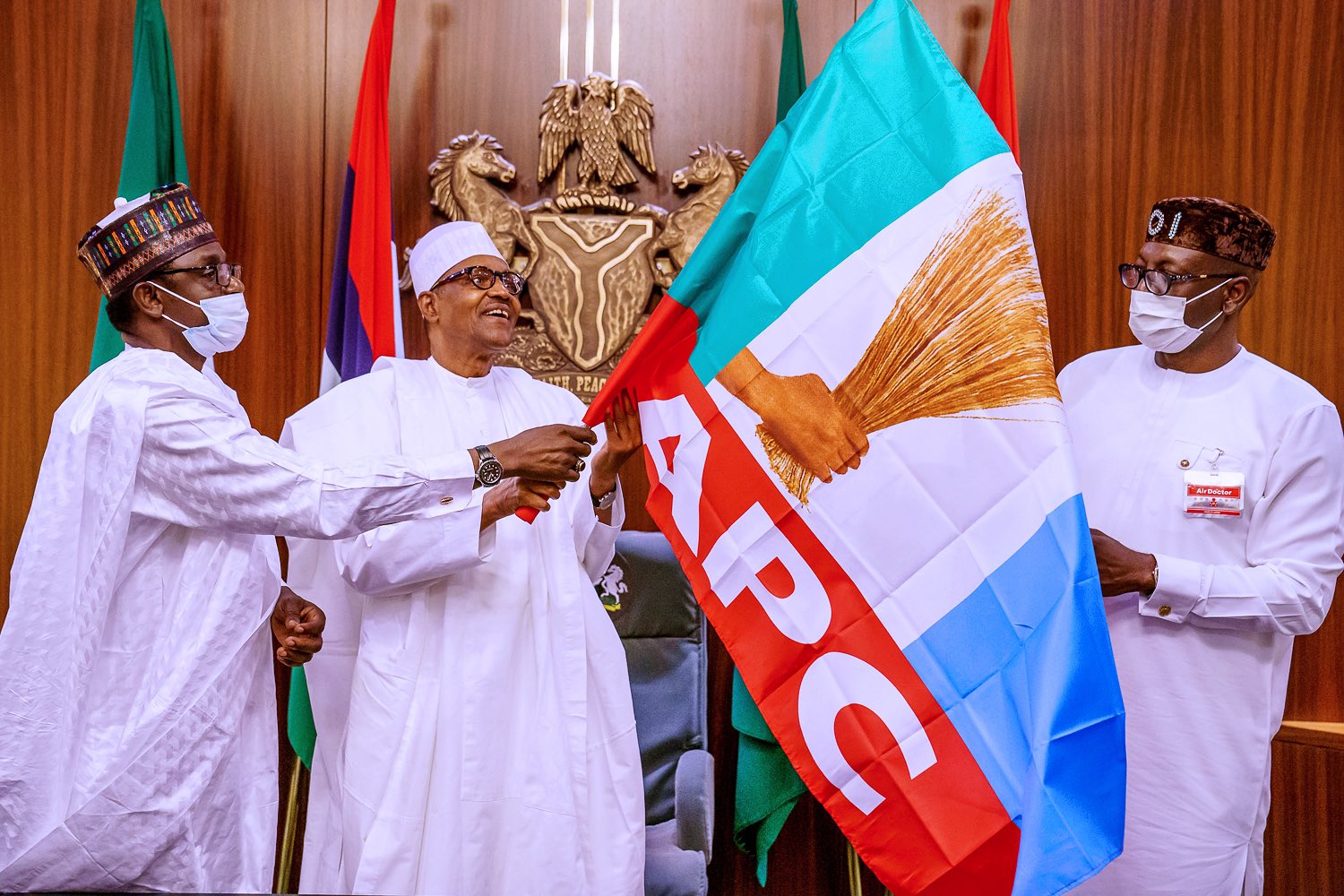Right now, the choice of presidential and Vice Presidential candidates for the 2023 general elections in Nigeria is the number one horror afflicting the psyche of Nigerians.
It is so much so that if a nation wide public opinion were to be conducted right now, the tendency that majority of Nigerians would tick-off the box concerning the tension arising from the presidential candidate of the ruling party at the center, APC Asiwaju Bola Ahmed Tinubu’s choice of Kashim Shetima as running mate for the 2023 presidential contest as their biggest concern in this present time is very high.
That is most especially if the opinion poll were to be conducted amongst members of the Christian and Muslim faiths to whom it has become a supremacy battle more than members of the political class.
And the distress is not only from the ruling party at the centre, APC.
To a lesser degree,the main opposition party,PDP’s decision to jettison the presidency rotation principle that the party had practiced since 1999, and throw it open to all the zones which has enabled its 2019 presidential candidate ,Turaki Atiku Abubakar to clinch it; is also a source of prickly heat and discontentment amongst voters,especially in the south-east and south-south zones of the country which have been the traditional stronghold of the party.
While the irritations caused by what critics see as an volte-face by the PDP is less caustic,the Muslim-Muslim ticket being presented by the APC is justifiably on the lips of every Nigerian-both politically conscious and religion sensitive.
Even as some deem the Muslim-Muslim presidential candidacy as a non issue,a lot see it as toxic and corrosive,depending on their religion and ethnic biases. This is as opposed to resorting to partisanship which used to be the main criteria for supporting or opposing presidential and vice presidential candidates.
In fact,as the issue of religion has been dragged into the political mix ,following the introduction of a Muslim-Muslim ticket for the presidency by Tinubu and Shettima,and since the faith composition of Nigerians is more or less a balanced equation of 50/50’, who becomes president of Nigeria,now matters to all of us-politicians and those that were apolitical.
Hence it is being discussed amongst a vast majority of Christians and Muslims alike in churches and mosques as well.
Before now,choosing a vice presidential candidate was just a routine chore for presidential candidates.And the equation was simple because it was always about walking the fine lines of religion and ethnicity. While the framers and writers of 1999 constitution of the federal republic of Nigeria were conscious of the religious and ethnic fault lines which have now widened into a gulf,they did not factor it into or incorporate it in our country’s statutes book expressly,so that crossing the line via a Muslim-Muslim or Christian-Christian ticket would be an outright violation and contravention of the laws of land.Instead of incorporating it into the constitution,it was not codified, but only recognized and treated as a mere understanding.
It is in pursuance of that balance that the religious sensitivities of Nigerians who are sharply divided along the lines of the two predominant faiths- Christianity and lslam, that when a Christian emerges as a presidential candidate,a muslim was chosen as the vice presidential candidate,and vice versa.
That was the case when after independence,and our country was operating a parliamentary system, Abubakar Tafawa Balewa became prime minister.And to strike a balance,Nnamdi Azikiwe became Governor General. It did not matter that the office of the former was executive,while that of the latter was merely ceremonial.
Some Nigerians still romanticize that period of parliamentary system of government 1960-66 which they fondly refer to with nostalgia as the ‘golden age’ of Nigeria that they would love our beloved country to return,if they can literally push back the hands of time.
That aspiration is underscored by the fact that back in those days,there was healthy competition amongst the four regions in our country and development,progress and prosperity of the people in respective the regions reflected the amount of vigor and acumen applied in harnessing and managing the natural resources endemic in each of them.That is because Nigeria was basically a natural resource exporting country to Europe and the rest of the world.
As such,the north was doing its utmost best to grow and harvest Cotton that was grown in Funtua area of katsina state that was feeding the textile miles in kaduna, the headquarter of the region.And that engagement was creating employment and generating revenue for the government via taxes.
Groundnut farming and processing into vegetable /edible oil was also flourishing in the northern region as it is also native to the zone and therefore a veritable employment creator via the factories and another major source of tax income.
A similar scenario was also present in the eastern region where oil palm was its main stay,and coal from the mines endemic in the area sustained the economy that was booming in and around Enugu,the headquarter of the region.The western region with cocoa as its main cash crop,and which was the commodity that attracted the highest premium,was the most buoyant.Owing to its high market value in the international market,cocoa farmers were prosperous and practically all the forests in the western region were being cultivated for cocoa to boost the income of the region.
And the Return- On-Investment ,ROI was quite significant.
Hence the western region became head and shoulder above other regions in terms of progress through advancement in education- free education,in terms of provision of infrastructure-first television station in black Africa,a stadium,the tallest building in Nigeria at that time-Cocoa house etc found home in lbadan,the headquarter of the region.
In Midwest region where rubber plant was the major cash crop,tapping rubber for latex in the form of lumps was the major occupation of the people until crude oil was discovered in Oloibiri ,modern day Bayelsa state in 1958 which changed the landscape of our country from a producing to a consuming one .
And Benin-city,the capital of Midwest,was the center of activities and it was complimented by Warri that was also brimming with fishery and other marine activities as well as logging/woodworks due to its coastal location and rain forest ecology.
As can be seen from the narrative above,before the discovery of oil/gas,all Nigerians in the four (4) regions had their hands on the plough,working tirelessly to boost the productivity and income of the country.
I guess that is why the period is referred to as the golden age,because we were a producing country before we became a consuming country when oil/gas was discovered. And it is an unfortunate situation which Labor Party, Presidential Candidate,Peter Obi has smartly converted to his campaign mantra which is that he will:Turn Nigeria From A Consuming To Producing Country.
In a manner that is sort of perverse and gutting,the availability of oil/gas in our country has become ‘oil curse’ instead of a booster to our original production output through farming and processing of cash crops earlier highlighted.That is what the United Arab Emirates,UAE has done with oil/gas in Abu Dhabi,while Dubai remains a trading and tourism haven,just as Ras Al Khaimah and the rest of the emirates that make up the seven (7) emirates nation, Ajman, Fujairah, Sharjah and Umm Al Quwain concentrate efforts on harnessing resources endemic in their locations and of which they have comparative advantage in producing.
Why did l decide to dredge up the past,readers may be wondering?
Well,the aim is to put in perspective the fact that,not until the parliamentary system bequeathed to us by the British colonialist when their rule over us was ending in 1960, was jettisoned and replaced with presidential system in 1979 by the military,all was well with Nigeria.And our country has the potential of becoming like the UAE,because it is endowed with all the ingredients that it has taken to make that Middle East country that is regarded as a wonder of the world,become like Paris and New York combined.
Back in the days,the regional capitals of Nigeria-Kaduna,lbadan,Enugu and Benincity were the centers of political and economic powers dispersed across the country as all the regions had autonomy and the local political leaders were making their own laws reflective of the peculiar dynamics of their people’s culture ,such as ethnic and religious orientations and inclinations.
Since ,only defense,foreign and internal affairs were mainly left in the purvey of the federal government with a prime minister incharge, government at the center was centrifugal and it was centripetal in the regions,as such prime ministerial or governor-generalship post was not that attractive to warrant the type of do or die attitude now invested in becoming president and Vice President of Nigeria currently sucking up all the oxygen in the political space and threatening to asphyxiate our beloved country.
And it is not a mere happenstance that the most prominent political leaders at that time,Sir Ahmadu Bello of northern region and Chief Obafemi Awolowo of western region chose to become premiers of their respective regions instead of moving to the centre to become prime minister of Nigeria.
As evidence of the ordinariness of the central government,Alhaji Abubakar Tafawa Balewa,from Bauchi state who was the second in prominence in the political hierarchy in the north was assigned by sir Ahmadu Bello to serve as prime minister.So invariably the best hands were reserved in the regions and the second best were dispatched to the center which was at that time,lagos- the seat of the federal government.
The exception to that rule was,Dr Nnamdi Azikiwe who was the most prominent leader from the east and instead of becoming the premier in the manner that Ahmadu Bello and Obafemi Awolowo had become premiers of their respective regions,conceded the premiership of eastern region to sir Micheal Okpara and opted to become the Governor General of Nigeria,a ceremonial role which he desired as a centrist.
What informed the decision of the military and their acolytes in the intellectual world as well as the establishment to switch from the parliamentary system that the British handed over to us and which was modeled after what they practice,has remained intriguing to me,and l guess to those keen on understanding the political evolution of Nigeria.
Having amalgamated the northern and southern protectorates in 1914,the British officials that had garnered huge administrative experience over a period in excess 50 years of superintending over Nigeria,knew that to a large extent that,the system that worked for their home country,UK was ideal for us.
The underlying reason for such belief would be that the United Kingdom that is made up of four major ethnic groups- English,Welsh,Scottish and Irish to form United Kingdom,UK was in more ways than one,similar to Nigeria comprising of multiple ethnic nationalities with three main tribes -Hausa/Fulani,Yoruba and lgbo as the three main ethnic groups.
As such the colonialist probably reckoned that the system that had worked for them for centuries was the best for us.And given the similarities in ethnic composition of the nationalities that have been united to form one country,Nigeria,they appeared to have been right in their assessment and decision to imbue us with their tested and proven system.So for the first six (6) years,1960-66,Nigeria experienced its ‘golden age’ until the military truncated the process via the 1966 coup detat,a counter coup six (6) months after and the descent into civil disturbances that culminated into a civil war in 1967 that lasted till 1970.
Even under autocratic administrations,when those that ruled by gun,instead of rule of law,were in charge,religious and ethnic balance was observed because it was critical for the sustenance of the survival of our country as one entity.
That is why general Ibrahim Babangida,a Muslim from Niger State had Admiral Augustus Aikhomu,a Christian from Edo state as his chief of staff Supreme Headquaters which is the equivalent of Vice President in a military regime.
And the tradition or trend continued when multi party democracy got reintroduced in Nigeria in 1979 after a long military interregnum that commenced in 1967.
Religious sensitivity did not wane,even after then leaders of Nigeria,perhaps in a brain wave or in a flight of fancy decided to jettison the parliamentary system bequeathed by the British colonialist and opted to experiment with American style presidential system of government,hence Shehu Shagari,a Hausa/Fulani from Sokoto state paired with Alex Ekwueme,a Christian from Anambra state to form the federal government in 1979 and in 1999, Olusegun Obasanjo, a Christian from Ogun state was joined by Atiku Abubakar from Adamawa state, a Muslim as
President and Vice President respectively .
If indeed,the switch from
parliamentary to presidential system is an experiment as l had presumed,having learnt or experienced first hand, it’s ugly consequences-high cost of operation and over centralization and concentration of power in an individual as president currently throwing up ethnic and religious issues-what are we waiting for to return to the good old days of parliamentary system when there was regional autonomy or form our own hybrid system which could be a mixture of both presidential and parliamentary systems based on our reality?
At least two countries in Africa,Ghana and Rwanda operate hybrid constitutions.
That is evidenced by the fact that the national constitutions of both countries are neither parliamentary or presidential.
Is Nigeria facing its own moment of truth ?
Should we not seriously address the elephant in the room which are the sticky points in the 1999 constitution of the federal republic of Nigeria?
In due course,I will return to the question of wether or not,as a country,we did not steer our ship of state into the wrong course by switching from parliamentary to presidential system of government in 1979.But having put things in context and perspective by reflecting on the past experience in our dear country,allow me dissect the curved ball which APC Presidential candidate,Asiwaju Bola Ahmed Tinubu’s choice of Kashim Shetima seem to have thrown to himself such that it may make or mar his chance of becoming the next occupant of Aso Rock Villa and even threatening the survival of our country as a nation.
The commonest argument in favor of a Muslim-Muslim ticket is that there is no Vice Presidential material amongst northern Christians.The counter argument to that is that the incumbent Vice President,professor Yemi Osinbajo was a political feather weight before he stepped into the role in 2015. Why was that not an issue ? Clearly, the reason that Tinubu did not pick a southern Christian as running mate is much more deeper than not finding a heavy weight Christian as being speculated in some quarters.
After all,there are a couple of serving Christian governors, ex governors and two former secretaries to federal government,one ex and the other serving,to choose from.
So,my take is that the northern Muslims do not consider northern Christians as part of the north,just as they also do not consider southern Muslims as prosper Muslims.
Therein lies the dilemma.
This is also why state of origin and birth have remained an issue as Nigerians are not free to adopt a state where they have lived,worked and even born as their state,so that they can vote and be voted for,as it obtains in the USA where former president Bill Clinton served as governor in the state of Arkansas and his wife Hillary later served as the senator representing the state of New York.The same applies to the Bush family that originally hail from Texas,but Jeb Bush,one of the sons of president George Bush of blessed memory,served as the governor of the state of Florida.
What the scenario playing out in our country where people of same country,but of different creeds are not accorded equal opportunities indicates,is that there may be segregation,and even apartheid in Nigeria. Yes, apartheid in Nigeria!
Hence after over one hundred (100) years of amalgamation (1914) of the northern and southern protectorates by the British colonialists,northern and southern Nigeria have failed to blend.
Back in the days,the motto/mantra of NATIONAL PARTY OF NIGERIA,NPN ,then ruling party (1979-1983) was:One Nation,One Destiny.
With the polarization of our country between extreme lines of religious divide in the run up to 2015 general elections and a situation that has persisted thereafter,can a Muslim-Muslim presidential ticket in 2023 which is a clear exclusion of members of the other faith in the multi ethnic and religious country,be said to be reflective of the slogan: one nation,one destiny?
While Islamic clerk sheik Ahmed Gumi belief about the APC and its presidential candidates resort to Muslim-Muslim ticket is that , “It has nothing to do with religion. Its pure vote-getting strategy and nothing more. It now depends on the voter to choose from a wide range of choices.”
Babachir Lawal, former Secretary to the Government of the Federation, SGF has a counterpoise to the point of view of the renown Islamic cleric.
“The northern governors and some northern Muslim elite must have persuaded him that they will never vote for a ticket that has a northern Christian on it.And he has agreed with them.But if he thinks a Muslim-Muslim ticket will win him the northern Muslim votes,he should have a rethink.They will massively vote for one of their sons because it is in their nature to do so”
And Ohanaze -apex lgbo socio-cultural organization through a press statement by its vice president-general , chief Damien Afam Okeke-Ogene has also warned that a Muslim Muslim ticket in 2023 election is a serious threat to the unity and corporate existence of Nigeria.He put it this way:
“APC presidential candidate choice of muslim — muslim ticket is not only ill-timed but also a total disregard to the diversity of the country and noted that this has undermined efforts of well meaning Nigerians over the years to bridge religious differences and promote ethnic harmonious co-existence.”
While acknowledging the cataclysm triggered by his choice of a fellow Muslim as running mate,the APC presidential candidate,Bola Tinubu,in a press statement justified his decision thus:
“Both sides of the debate have impressive reasons and passionate arguments supporting their position.Both arguments are right in their own way.But neither is right in the way that Nigeria needs at the moment.As president,I hope to govern this nation toward uncommon progress.”
But Christian APC members in the north do not agree with their presidential candidate,Tinubu.
And they did not mince words when they stormed Aso Rock Villa seat of presidential power in their numbers to register their dissent to Muslim-Muslim presidential ticket to president Mohamadu Buhari.They bared they mind thus:
“Mr. President, since the return of democracy in 1999 in Nigeria,the tradition has been a Muslim-Christian or Christian-Muslim paring by all political parties.And this has to a large extent,ensured religious harmony in the country.
“However, the move by our party to adopt a Muslim-Muslim ticket is most insensitive and the height of discrimination against Christians in our country. This is on the heels that other political parties indeed reflected the religious balance in the composition of their presidential team.”
Clearly, Nigerians from all sides of the political divides-ethnic and religious are speaking out against what appears like APC Abracadabra.
And from the excerpt from his media statement earlier highlighted ,Tinubu knows that he is in a dilemma with respect to his choice of a Muslim running mate ,but he hopes to prevail via dexterous political maneuvering.
But would he triumph this time ?
It is noteworthy that at other times,the interest of Nigerians on the choice of presidential candidates and their running mates would be influenced only by political parties affiliations.
Today, it is the faith of both candidates for the office of the president and Vice President of Nigeria that is a priority and being Muslim-Muslim is creating a ruckus simply because it is considered toxic by both Muslims and Christians alike who cherish harmonious co-existence that can only be achieved via equitable distribution of political power in a multi religion and multi ethnic country like ours.
Our forebears recognized the need,and entrenched the values through Federal Character principle enshrined in the 1999 constitution.
But Tinubu’s gambit of a Muslim- Muslim ticket implies that he has elected to discountenance the precautions taken by authors of the 1999 constitution to avoid the crisis of exclusion that has gripped the country since the ascension of APC to power at the center in 2015 reflected by the continued denigration or neglect of the federal character principle that is meant to be the glue holding the nation together in a manner that all the members of the union would have a sense of belonging.
It is commonsensical or a no-brainer to figure out that the violation of the federal Character principle entrenched in the 1999 constitution via exclusion of some tribes from appointment into strategic public offices and the reported monopolization of strategic public office positions by members of mr president’s tribe and religion that have manifested in the proliferation of separatist or secessionist groups like the proscribed Independent Peoples of Biafra IPOB led by Nnamdi Kanu in the eastern flank of our country and Oduduwa Republic promoter, Sunday Igboho in the south west zone,as well as other fringe groups in the middle belt region currently threatening the continued existence of our beloved country as one nation.
The demon of disharmony in our country would certainly be fed fat and inter tribal and religious conflicts exacerbated, if politics is allowed to be mixed with religion in a manner that APC and its presidential candidate are about to do which is a dangerous brew and ill wind which would blow no one any good.
Interestingly,the presidential system of government that is being operated in Nigeria since 1979 is modeled after the United States of America,USA’s system.
Unlike the USA constitution which is a four (4) page document has been in operation since 1787 when it was first written and operationalized a year after, and of which 33 amendments have been proposed with 27 approved and incorporated into the constitution after going through rigorous process of vetting:our law makers are yet to effect major amendments in the 1999 constitution.That is despite the fact that most Nigerians have rejected the constitution which they regard as being made by military diktat as it is a product of the military which handed over 1979 and the 1999 constitutions,of which the latter is an improvement on the former and to some critics,even a sort of mere addendum.
The issues of rotation of power between north and south zones which is currently at a gentleman agreement level,and therefore subject to manipulation; the nebulous minimum educational qualifications to become president which is malleable,and the lack of clarity about the unviable nature and therefore a clear prohibition of a Muslim-Muslim or Christian-Christian tickets at the federal government level or in states where the dominant religion is not above 70% currently about to trigger a political fiasco; are issues bedeviling our country because they are not codified or incorporated into the constitution as amendments in the way that Americans do.
In my view,if our leaders really want to fix Nigeria,the next national assembly has its work cut out for it,as the initiatives outlined above are simple and critical panacea ,remedies or cures for the incongruities that we have discovered in the course of operating the 1999 constitution in these past twenty three (23 )years that it has been our country’s statutes book.
Nigeria can borrow a leaf or two from Canada and Switzerland where the French speaking and other ethnic minorities in those climes share equal rights in the constitution with the majority English speaking ones ,including rotation of presidency amongst unequal parties,particularly in Switzerland.
In conclusion,l recently came across a whatsapp message with the photo of a little Caucasian girl crying.
On top of the image was the question to the crying girl:are you Hindu,Christian or Muslim? She answered: I am hungry.
The message ends with the admonition: MAKE HUMANITY YOUR RELIGION.
Remove Hindu and Caucasian girl from the picture,and replace with a Nigerian girl to create a local context; then pose the similar question: are you Christian or Muslim? To a distressed average Nigerian girl in Sokoto,the heartland of Hausa/Fulani where Muslims are predominant; and do the same in Abeokuta in Yoruba land, populated mainly by people of Christian faith; then replicate it in Aba in Abia state peopled by the lgbos that are mainly Christians: l can bet that the answer from the anguished girl would be: l am hungry.
It would not be: l am Muslim or Christian.
Clearly, hunger which spares no one based on religion, and starvation are increasingly becoming the lot of most Nigerians right now as a result of the amplification of our religious differences by politicians for unmerited advantage leading to conflicts that have displaced farmers and dramatically disrupted lives and livelihoods.What the demagogues tend not to realize is that the so called advantages are temporary and often come back to haunt them in the manner that some are currently refugees as they are cut off from their homesteads due to insecurity.
Take for instance the injection of Boko Haram into politics along with it’s more virulent variant ISWAP, herdsmen militia in the north and known and unknown gun men in the south east and the calamities those avoidable brigands are wreaking on politicians.Is it not a shame that today ,some of them can not go home to their constituents for fear that they may be kidnapped or killed by the monsters that they literally bred.
So,why don’t our politicians try to be religion and tribe neutral and focus more on the proposed programs and projects that would lift majority of Nigerians out of poverty and put them on the path to prosperity?
I will demur from citing Nigerian Bureau Of Statistics,NBS data to validate my assertion that hunger is ravaging our fellow compatriots, as such we must pay more attention to how to pull the masses out of hunger.
That is due to the fact that l am convinced that we all know without being told that life in Nigeria has become brutish and hellish owing to the mismanagement of our multiple ethnic and religion relationships.
As the Central theme or advocacy of the earlier referenced whatsapp message prods us:
Make humanity your religion.
How we in Nigeria can imbibe that message: MAKE HUMANITY YOUR RELIGION should be a raison detre or a sort of desiderata in our country.
lt is a necessary first step towards liberating our country from the shackles of religion and ethnic idiosyncrasies currently hobbling our country’s quest for nationhood.
That should be the mission of our politicians,not how to divide the country along ethnic and religious lines which the Muslim-Muslim presidential ticket of the APC candidates Bola Ahmed Tinubu and Kashim lbrahim Shetima tend to portend.
I have made a case in the past that it is about time that our political leaders applied the strategy of expanding the pie or value to be negotiated by putting all the political offices that are to be shared on the table upfront.
Nigerians would be less agitated or distressed,if they know in advance what they would get in the political calculus while negotiating power sharing arrangements between the north and south,Muslims and Christians alike.
My advocacy for a change in the political power sharing formula is inspired by the reality that the presidency rotation principle adopted since the return of multi party democracy since 1999,has become obsolete,therefore unimplementable in equitable manner.
And the reasons are two folds.The first is that it is mainly due to the changing political landscape which has seen the south holding on to the presidency much longer than anticipated resulting in the loss of faith in the system by the north in particular.
Take for instance,the president Umaru Yar’adua/goodluck Jonathan presidency which ended abruptly in 2010 due to the sudden passage of Yar’adua compelling Jonathan to complete that term and commence his own tenure in 2011 which got terminated in 2015.
Secondly,also take a look at the current eight (8) years tenure of president Muhamadu Buhari which kicked-off in 2015 and will be expiring in may next year.
Then think about the likelihood of the north remaining in power beyond 2023, when the northerners vote massively for the PDP candidate,Atiku Abubakar,who is one of their own.
It is a reality that the APC initially acknowledged by ditching Rotimi Amaechi and Yemi Osinbajo who were initially the front runners for the presidency when the party was inclined to allow power to return to the south.But its attempt to field Ahmed Lawan,the current senate president as it’s presidential candidate to serve as a counter force to PDP’s Atiku Abubakar ascendancy into Aso Rock Villa next year was checkmated by APC governors from the north who aligned with Tinubu’s quest ,for the selfish reason that after Tinubu’s eight (8)years,power would return to the north and much faster than,if Ahmad Lawan were to become president for eight (8)years,and power returns to the south for another eight (8) years.This implies that the governors interested in the presidency would have to wait for sixteen (16) years with Lawan as president as opposed to eight (8) years,if Tinubu were to become president.
Thus Ahmed Lawan’s ambition to be president in 2023 became a casualty as Tinubu’s hurricane-like political force torpedoed it like a ferocious and subversive submarine craft,by wining the 6-8 June presidential primaries of the APC against the run of place.
After one month of assessment of its best options,following its victory on June 8 ,the Tinubu camp that was probably unprepared for their victory,hence the name of a vice presidential candidate was not already in the breast pocket of the candidate as he was entering the primaries contest on 6th June,was eventually able to hash out the name of Kashim lbrahim Shetima as his running mate.
But instead of dousing the flame that Tinubu’s victory at the party primary election which was like a lightening rod had ignited,appointing a running mate has raised the crisis to Code Red or something akin to pouring gasoline/petrol into a burning fire.
And no one can tell how far the conflagration would go in further widening the fault lines in our beloved country into a gulf ,and even result in a serious chasm amongst the good people of Nigeria that are blessed with multiple ethnic and religious orientations of which there is one parentage- Abraham- father of Isaac and Ismail the originators of Judaism , Christianity and Islam.
Why can Nigeria not have a sort of peaceful interrelationships arrangement in the Middle East known as:
The Abraham Accords Declaration, which states:
“We believe that the best way to address challenges is through cooperation and dialogue and that developing friendly relations among States advances the interests of lasting peace in the Middle East and around the world.”
According to Wikipedia,
“The Abraham Accords are a joint statement between the State of Israel, the United Arab Emirates, and the United States, reached on August 13, 2020. Subsequently, the term was used to refer collectively to agreements between Israel and the United Arab Emirates and Bahrain.”
Arising from that agreement,amongst other positive developments,Israeli high technology firms are currently operating in Jebel Ali ports in Dubai jointly developing softwares with the UAE and there is currently direct flight between Saudi Arabia and Israel.That simply amplifies the fact that with determination,the seemingly impossible can become possible.
For long,l have lived with the morbid fear that religion is like a keg of gunpowder which is laid underneath our country Nigeria that could one day inadvertently be ignited and result in a combustion of catastrophic consequences.
But,l had reckoned that the unfortunate catastrophe may happen in the form of a heinous crime of beheading of a member or members of the opposite religions by fanatics resulting in reprisal actions between Muslims and Christians.
Thankfully,our law enforcement agencies -DSS ,police,army etal have been able to do a great job of mitigating that risk.And l always heaved a sigh of relief each time such dastardly criminal acts occurred and things did not get unhinged with aggrieved people taking the laws into their hands.
But the introduction of a Muslim-Muslim ticket for the presidency of Nigeria in 2023 was unimaginable to me.
More so because it was contemplated in 2015 and quickly dropped because it was felt that it was just too hot to handle.
So,l never contemplated,how much more engage in any scenario building around it.
Suddenly,it is in our face.
And hell appears to have been let loose via the raging verbal fire works.
I pray it stays that way until reason eventually prevails when elders in the room truly earn the title by stepping up to the plate.
Before then,good lord, take control.
Magnus Onyibe, an entrepreneur, public policy analyst, author, development strategist, alumnus of Fletcher School of Law and Diplomacy, Tufts University, Massachusetts, USA and a former commissioner in Delta state government, sent this piece from lagos.
To continue with this conversation, pls visit www.magnum.com.
